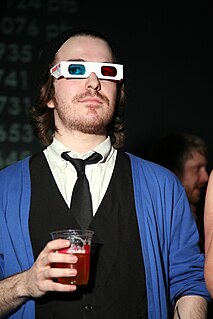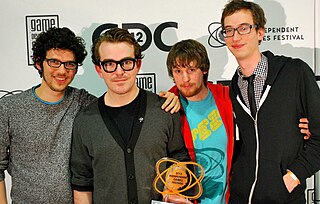A video game developer is a software developer that specializes in video game development – the process and related disciplines of creating video games. A game developer can range from one person who undertakes all tasks to a large business with employee responsibilities split between individual disciplines, such as programming, design, art, testing, etc. Most game development companies have video game publisher financial and usually marketing support. Self-funded developers are known as independent or indie developers and usually make indie games.

The Game Developers Choice Awards are awards annually presented at the Game Developers Conference for outstanding game developers and games. Introduced in 2001, the Game Developers Choice Awards were preceded by the Spotlight Awards, which were presented from 1997 to 1999. Since then, the ceremony for the Independent Games Festival is held just prior to the Choice Awards ceremony.

The Game Developers Conference (GDC) is an annual conference for video game developers.

The International Game Developers Association (IGDA) is a nonprofit professional association whose stated mission is to "support and empower game developers around the world in achieving fulfilling and sustainable careers."

Robert "Bob" Bates is an American computer games designer. One of the early designers of interactive fiction games, he was co-founder of Challenge, Inc., which created games in the 1980s for the pioneering company Infocom. After Infocom's dissolution in 1989, Bates co-founded Legend Entertainment to continue publishing games in the Infocom tradition, but with added graphics. He has designed, written, or produced scores of games, including Unreal II (2003), Spider-Man 3 (2007), and Eric the Unready (1993), listed as Adventure Game of the Year by Computer Gaming World magazine and also included on the 1996 list of "150 best games of all time". In 1998 he wrote the award-winning game Quandaries for the U.S. Department of Justice. He has twice been the chairperson of the International Game Developers Association, which honored him with a Lifetime Achievement Award in 2010. Bates has written extensively about game design and development in works such as the 2001 book Game Design: The Art and Business of Creating Games, which is commonly used as a game design textbook in college courses. From 2011–2014, Bates was Chief Creative Officer for External Studios at Zynga. He continues to work as an independent consultant with various publishers in the games industry.

Don Daglow is an American computer game and video game designer, programmer and producer. He is best known for being the creator of early games from several different genres, including pioneering simulation game Utopia for Intellivision in 1981, role-playing game Dungeon in 1975, sports games including the first interactive computer baseball game Baseball in 1971, and the first graphical MMORPG, Neverwinter Nights in 1991. He founded long-standing game developer Stormfront Studios in 1988.
Derek K. Smart is an American video game designer. He is the president and lead developer of 3000AD, Inc., an indie game development company based in Aventura, FL. In addition he is the president of and investor in the video game development company Quest Online. Smart is an independent video game designer and software developer, and the creator of several video game series.

Christopher Bryan Hecker is an American video game programmer and commentator. He is the founder of the gaming company Definition Six and best known for his engineering work on Will Wright's 2008 game Spore. Hecker is an advocate for the indie game industry and co-founder of the Indie Game Jam. He has written a number of influential articles on programming and has been an editor for Game Developer Magazine and the Journal of Graphics Tools.
In the video game industry, an independent (indie) game refers to games typically created by individuals or smaller development teams without the financial support of a large game publisher, in contrast to most "AAA games". The term may also refer to those games financed by publishers who do not exert significant artistic control on the developers. Because of their independence and freedom to develop, indie games often focus on innovation and taking risks not usually afforded in AAA games, and may explore the medium to produce unique experiences in art games. Indie games tend to be sold through digital distribution channels rather than at retail due to lack of publisher support. The term is synonymous with that of independent music or independent film in those respective mediums.

Fez is an indie puzzle-platform video game developed by Polytron Corporation and published by Trapdoor. The player-character Gomez receives a fez that reveals his two-dimensional (2D) world to be one of four sides of a three-dimensional (3D) world. The player rotates between these four 2D views to realign platforms and solve the game's puzzles. The object of the game is to collect cubes and cube fragments to restore order to the universe.

Robin Hunicke is an American video game designer and producer. She is a professor of game design at UC Santa Cruz and the co-founder of Funomena.

Vlambeer is a Dutch independent game development studio made up of Rami Ismail and Jan Willem Nijman, founded in 2010. The studio is known for its games Nuclear Throne, Ridiculous Fishing, Super Crate Box, Serious Sam: The Random Encounter and Luftrausers and for its stand on video game cloning.

Philippe Poisson, better known as Phil Fish, is a French-Canadian former indie game designer best known for his work on the 2012 platform game Fez. He was born and raised in Quebec, where his experiences with Nintendo games in his youth would later influence his game design. He studied game design at the Montreal National Animation and Design Centre, and worked at Ubisoft and Artificial Mind and Movement before starting Polytron in 2008.
The Indie Megabooth is section at game expositions dedicated to the display and promotion of indie games. It launched at PAX East 2012 and appeared at other PAX events before expanding to other shows including the Eurogamer Expo, Electronic Entertainment Expo, Game Developers Conference, and Gamescom. It was founded by Kelly Wallick, who became the booth's full-time organizer in 2013.

Ridiculous Fishing is a mobile fishing video game where players use motion and touch controls to catch fish and subsequently shoot them out of the sky for cash. The game is known for its developers' battle against a cloned version of their game released by another company. The game was developed and published by Vlambeer—Rami Ismail and Jan Willem Nijman—and released for iOS on March 13, 2013, and later that year for Android.
Mattie Brice is an independent video game designer, critic, and industry activist. Her games and writing focus on diversity initiatives in the games industry, discussing the perspective of marginalized minority voices to publications like Paste, Kotaku, and The Border House. Her games are freeware and do not require programming to create.

Greg Wohlwend is an American independent video game developer and artist whose games include Threes! and Ridiculous Fishing. He originally formed Intuition Games with Iowa State University classmate Mike Boxleiter in 2007 where they worked on Dinowaurs and other small Adobe Flash games. Trained as an artist, Wohlwend worked mainly on the visual assets. As Mikengreg, they released Solipskier, whose success let the two take a more experimental approach with Gasketball, which did not fare as well. At the same time, Wohlwend collaborated with Asher Vollmer to make Puzzlejuice, and with Adam Saltsman to make Hundreds based on Wohlwend's first game design. He later released Threes! with Vollmer in 2014 to critical acclaim. His later games TouchTone and TumbleSeed were also the products of collaborations. Wohlwend was named among Forbes' 2014 "30 under 30" in the games industry.

The high-profile and protracted five-year development of the video game Fez led to its status as an "underdog darling of the indie game scene". The 2012 puzzle platform game built around rotating between four 2D views of a 3D space was developed by indie developer Polytron Corporation and published by Polytron, Trapdoor, and Microsoft Studios. Over the course of the game's development, Fez designer and Polytron founder Phil Fish received celebrity status for his outspoken public persona and prominence in the 2012 documentary Indie Game: The Movie, which followed the game's final stages of development and Polytron's related legal issues. The game was released to critical acclaim as an Xbox Live Arcade timed exclusive, and was later ported to other platforms. It had sold one million copies by the end of 2013.

Bob De Schutter is a Belgian video game designer and researcher, who is the C. Michael Armstrong professor of Applied Game Design at Miami University. He is best known for his work on the design of video games for players in middle through late adulthood. He has advocated the importance of play in later life and has spoken out against the stereotyping of older video game players in marketing and game design. He has also published on the design of experimental classrooms for gameful instruction.

The Path of Motus is an independent video game designed by Michael Hicks for PlayStation 4, Xbox One and PC. The game follows a goblin named Motus who is trapped inside a mysterious forest. He plans to escape by building bridges through the forest, but his determination is challenged by bullies that use their own words to destroy him. The game was made using the MonoGame engine.














